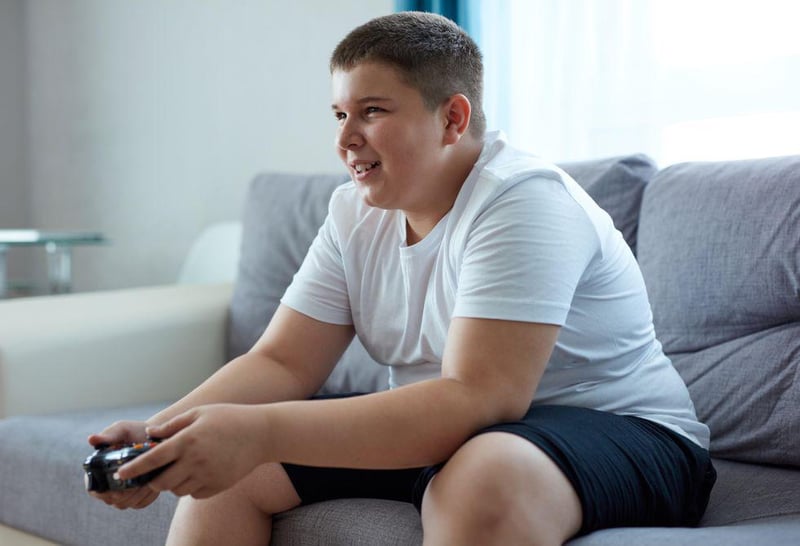Get Healthy!

- Amy Norton
- Posted November 19, 2021
Pandemic Curbed Kids' Efforts to Lose Excess Weight
A new study is highlighting yet another consequence of the COVID-19 pandemic: It has likely made it even harder for kids with obesity to manage their weight.
The findings, researchers said, are no surprise. Many adults, faced with normal life being upended during the pandemic, have seen changes on the bathroom scale.
It's also clear kids have not been spared, either. A recent government study found that during the first nine months of the pandemic, U.S. children and teenagers gained weight at twice the rate they had in the two years prior.
And while COVID restrictions have eased, life is not back to "normal," said Bradley Appelhans, the lead researcher on the new study.
"Kids are back in school now, but some activities are still curtailed," said Appelhans, an associate professor at Rush University Medical Center in Chicago.
More generally, he noted, there is a question of whether the pandemic has altered families' daily routines in ways that will continue to make a healthy lifestyle more challenging.
For the study, Appelhans and his team tracked 230 children from urban, low-income families who were enrolled in a clinical trial testing an obesity treatment program -- either before or during the pandemic.
Pre-pandemic, Appelhans said, the program included in-person sessions for parents and other caregivers, offering them tactics to help their kids eat healthier and get exercise.
Once the pandemic hit, those sessions moved online or over the phone.
And for children in the program during that time, any benefits were diminished, the study found.
Over one year, these kids typically saw an increase in their body mass index (BMI) -- a measure of weight in relation to height. That stood in contrast to children in the program pre-pandemic: They typically showed a decrease in BMI that was sustained over one year.
The researchers suspect the findings reflect the conditions of the pandemic, rather than an ineffectiveness of tele-sessions.
"Even though families were getting support, kids were still stuck at home, with nothing but the refrigerator and video games for distractions," Appelhans said.
School, he noted, gives kids outlets for exercise and free or reduced-cost meals, as well as a general structure for the day.
That lack of daily structure could be one of the major reasons for kids' weight gain during the pandemic, said Amanda Staiano, a researcher who was not involved in the study.
No one is blaming families under stress and dealing with home-schooling.
"Clearly, we know families were and are experiencing a lot of stress," said Staiano, an associate professor of pediatric obesity and health behavior at Pennington Biomedical Research Center in Baton Rouge, La.
But, she added, it does take a "whole family commitment" to help get kids back into a healthier routine.
"That can mean just going outside for a walk around the neighborhood together," Staiano said.
Low-income, urban families like those in the study were hard-hit by the pandemic in many ways.
And it was urban kids who had the hardest time staying physically active under pandemic restrictions, said Nicole Fearnbach, a spokeswoman for The Obesity Society who is also a researcher at Pennington.
Indoor exercise is easier said than done for families without the space, or money for special equipment, she noted. And many kids lacked safe or accessible outdoor areas to be active.
Plus, exercise is only part of the story. It's clear, Fearnbach said, that the pandemic negatively affected many kids' diets, sleep patterns and, not least, mental well-being.
Fearnbach said that if parents need help getting their kids back into a healthier routine, they can talk to their pediatrician.
Staiano suggested parents also find out what their child's school is doing to provide opportunities for exercise.
Families who are having a hard time establishing healthier routines should not feel "discouraged," Appelhans stressed.
"Many families have been struggling," he said. "If you're struggling, you shouldn't feel like you've failed."
There are reasons for some optimism. Now that school-aged children are eligible for COVID-19 vaccination, Fearnbach said, parents may be more comfortable getting them into activities.
Staiano also noted that in the study, family participation in the weight management program was just as high during the pandemic as before.
"Even during the pandemic," she said, "families were making this a priority."
The findings were recently published online in the journal Obesity.
More information
The American Academy of Pediatrics has advice on parenting during the pandemic.
SOURCES: Bradley Appelhans, PhD, associate professor, preventive medicine, Rush University Medical Center, Chicago; Amanda Staiano, PhD, associate professor, pediatric obesity and health behavior, Pennington Biomedical Research Center, Louisiana State University, Baton Rouge; Nicole Fearnbach, PhD, spokeswoman, The Obesity Society, Silver Spring, Md., and assistant professor, research, Pennington Biomedical Research Center, Baton Rouge; Obesity, Nov. 5, 2021, online




